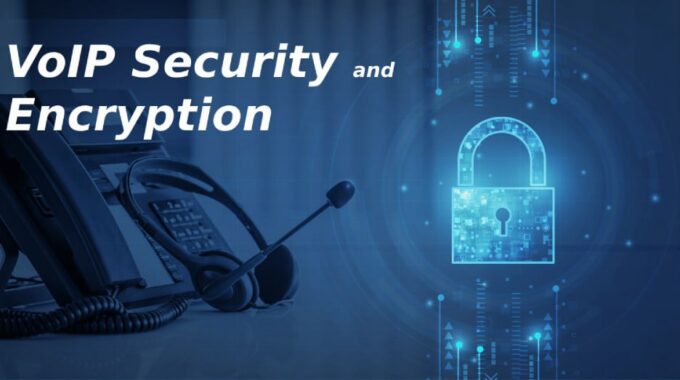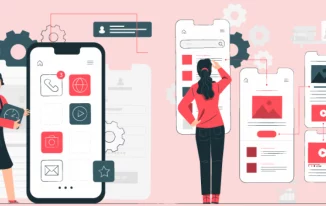With the rise of remote work and the increasing use of Voice over Internet Protocol (VoIP) services, it’s more important than ever to ensure the security of your voice data. Cybercriminals are always looking for ways to intercept sensitive information, and VoIP calls are no exception.
Without proper encryption, hackers can easily listen in on your conversations and steal sensitive data such as credit card information, social security numbers, and more.
In this post, we'll share some essential steps you can take to secure your VoIP calls and protect your privacy. From choosing the right service provider to implementing encryption protocols, we’ll cover all the basics of VoIP security. Keep reading to learn how to secure your voice and stay protected from cyber threats.
Steps to Secure VoIP Phone System
1. Using a VoIP Firewall
Establishing a digital firewall creates a barrier that separates your voice over internet protocol (VoIP) network from the public internet. By using predetermined security rules, you will be able to exercise control over both incoming and departing communications.
When it comes to protecting your private VoIP system, you absolutely need to have a firewall. However, if you want to take your security to the next level, you can use a dedicated VoIP firewall that is created exclusively to manage real-time audio and video traffic. Both SonicWall and Cisco VoIP firewalls are popular choices to consider if you are interested in going in this direction.
Following the selection of a VoIP firewall, you will be able to collaborate with your service provider to ensure that it is configured appropriately by configuring particular ports and protocols.
Among these tasks will be the activation of stateful packet inspection, the configuration of your access control lists, and the implementation of network address translations.
The fact that you are unfamiliar with these security standards is not a cause for concern. When it comes to setting up your VoIP firewall, the majority of VoIP companies will provide support.
After everything is finished, the only thing you need to concentrate on is maintaining a regular review schedule for your firewall logs and testing for vulnerabilities in the network.
Do not forget that technology cannot do all of the job for you. In order to ensure the safety of your network, it is essential to implement a stringent firewall approach that is customized to your particular VoIP configuration.
2. Perform the installation of anti-malware and anti-virus software
The majority of people that are knowledgeable about technology are already aware of the significance of antivirus and anti-malware software.
Your devices are protected against malicious software like as viruses, worms, and trojan horses that may take advantage of your network. Even worse, they are also able to target any VoIP devices that are connected to a server or device that has been compromised.
If you want to safeguard your VoIP devices from any viruses and malware, the first thing you will need to do is choose a reliable anti-virus program. If you are looking for a solution that is tailored exclusively for corporations and enterprises, you should investigate options such as Symantec Endpoint Protection or Trend Micro.
Make sure that you install your software on all of the computers, laptops, servers, and other pieces of information technology gear that are involved with your VoIP system once you have acquired it.
In the next step, you will set it to do routine scans on all of the device's memory, applications, boot records, files, and networks. Not only will this protect your VoIP devices from any viruses that could be there, but it will also notify you of any unusual or suspicious behavior that occurs inside your network.
3. Make use of a virtual private server for increased safety
You may further strengthen the security of your VoIP network by hosting your VoIP phone system on a Virtual Private Server (VPS), which is another recommended best practice. By separating your system from other common networks, which might potentially expose your devices to possible security dangers, a virtual private server (VPS) provides an additional degree of protection.
A number of virtual private server (VPS) companies have specialized in hosting voice over internet protocol (VoIP) systems. Many people choose to use Vultr, Linode, and Amazon Web Services (AWS).
Following the selection of your virtual private server (VPS) software, you will be able to collaborate with your VoIP provider in order to install and configure your VoIP devices on your newly acquired private server.
Following the configuration of your devices on your virtual private server (VPS), you have the ability to modify access restrictions, firewalls, and other security measures in order to provide an additional layer of protection to your devices.
Monitoring the consumption of resources on your virtual private server (VPS) is the only additional step that you will need to perform. To put it another way, if you do not have sufficient random access memory (RAM) or central processing units (CPUs) that are capable of supporting a large number of concurrent calls on your network, you could be required to upgrade your existing virtual private server (VPS) plan via your VPS provider. This is of utmost significance for companies that face the possibility of increasing their utilization of VoIP devices as their firm expands.
4. Enable encryption for voice over internet protocol
It is impossible for potential hackers to take advantage of your sensitive information if they are unable to comprehend it. This is what you are able to do with VoIP encryption; it scrambles communication on both sides, ensuring that your calls, texts, and messages remain secret as they go from one device to another throughout the process.
However, in order for this to be successful, encryption has to be enabled on all of your devices. This includes IP phones, softphones, gateways, and PBX systems. It is also important to bear in mind that genuine encryption is a highly technological procedure, and the method of setting it up differs from one system to the next.
You should seek the assistance of a professional or get in touch with your VoIP provider in order to deploy encryption in your network if you want to encrypt the messages that are sent and received on your VoIP devices.
5. Restriction of VoIP Traffic That Is Not Necessary
While you are working to ensure the safety of your VoIP devices, there is a good probability that there are some individuals that you do not want to have access to your network. Following the configuration of your VoIP network, you will be able to prevent unwanted traffic by using access control lists, virtual local area networks (VLANs), and other firewall techniques.
Not only does this provide you the ability to ban certain people, but it also gives you the ability to alter access rights for VoIP devices and programs. This is an excellent preventative precaution for huge corporations that want to ensure the safety of their organizations on the inside as well as the outside.
6. Make your VoIP servers more secure
The term "hardening" refers to the process of securing your VoIP server from any vulnerabilities by performing a number of security responsibilities.
Changing your default passwords, disconnecting any network services that are not being utilized, implementing the most recent operating system security updates, and setting alerts to watch for potential security risks are some of the chores that fall under this category.
One of the most advantageous aspects of this procedure is that it does not need any assistance from your VoIP provider. As an alternative, you may collaborate with the administrator of your server to go through each step.
7. Utilize Secure Passwords and Two-Factor Authentication on Your Account
The majority of VoIP security breaches are caused by weak passwords, despite the fact that this seems like an apparent recommended practice. You should update the default passwords for all of your VoIP equipment, administrative accounts, web portals, and any other access points to your network in order to prevent your network from being compromised by these possible breaches.
Additionally, you may make use of password generators such as LastPass, Norton, and 1Password to guarantee that you are using two-factor authentication and solid passwords in order to protect your electronic devices.
Considerations Regarding the Security and Encryption Obligations of Your VoIP Provider
You are already receiving many of the greatest security measures if you are currently utilizing one of the top VoIP providers on the market. This is because you are already receiving these practices. On the other hand, if you are still investigating your choices, take note that your VoIP service need to supply a number of different security features.
1. The Encryption of VoIP
It is in your best interest to ensure that your VoIP service provides media and signaling encryption by default; but, you should not stop there. Ask your VoIP provider about the strength of its encryptions to ensure that you are protected to the fullest extent possible.
In an ideal scenario, your service provider would use Advanced Encryption Standard (AES) encryption with 256-bit keys in order to provide comprehensive security throughout your network. You should also make sure that your encryption keys are frequently regenerated in order to prevent any possible attempts at decryption from hackers who could be attempting to get into your system.
2. The Compliance with Security Standards
When choosing a provider for voice over internet protocol (VoIP), it is important to ensure that the company complies with basic security control standards and frameworks. The following is a list of several certificates that you have to be on the lookout for:
A provider's controls for security, availability, processing integrity, confidentiality, and privacy are shown in a SOC 2 report. SOC 2 reports are also known as SOC 2 reports. Compliance with SOC 2 demonstrates that your supplier places a high priority on security and that your sensitive information is being handled by a trustworthy organization.
Compliance with the Payment Card Industry Data Security Standard (PCI DSS) is required by VoIP service providers who do business with credit card processing companies. When doing business using VoIP devices, this is of utmost significance for companies that have a responsibility to guarantee the security of their customers' financial information.
An information security management system that is provided by a supplier may be validated via the ISO 27001 certification process. As an additional point of interest, it is important to note that in order to get ISO 27001 certification, a provider's information security management system must undergo an external audit that is certified.
If your VoIP service has been certified to meet the requirements of ISO 27001, you may have peace of mind knowing that your information is secure.





